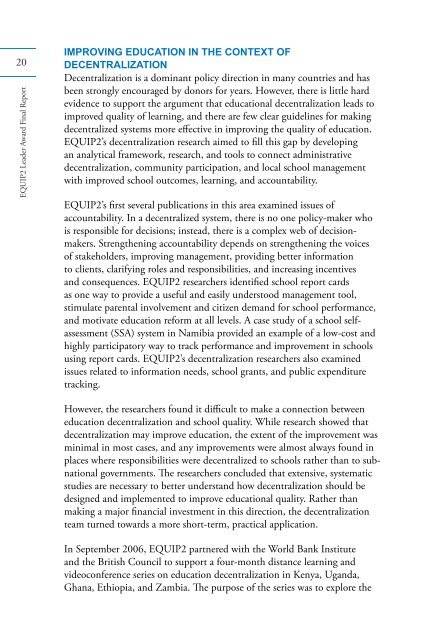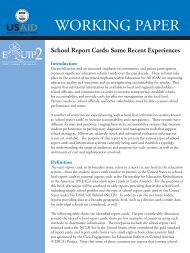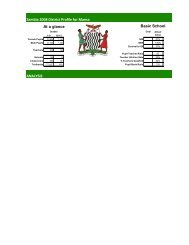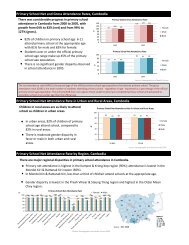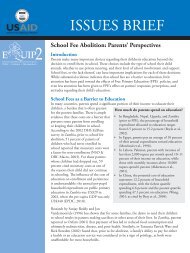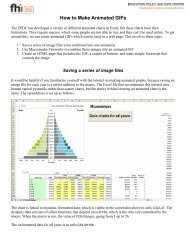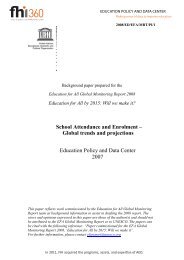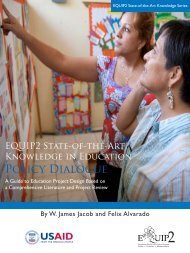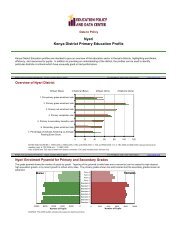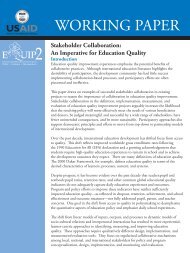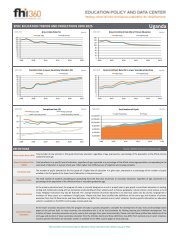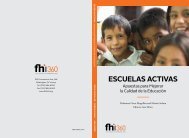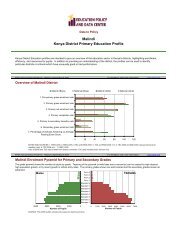EQUIP2 Final Report.pdf - Education Policy Data Center
EQUIP2 Final Report.pdf - Education Policy Data Center
EQUIP2 Final Report.pdf - Education Policy Data Center
Create successful ePaper yourself
Turn your PDF publications into a flip-book with our unique Google optimized e-Paper software.
20<br />
<strong>EQUIP2</strong> Leader Award <strong>Final</strong> <strong>Report</strong><br />
IMPROVING EDUCATION IN THE CONTEXT OF<br />
DECENTRALIZATION<br />
Decentralization is a dominant policy direction in many countries and has<br />
been strongly encouraged by donors for years. However, there is little hard<br />
evidence to support the argument that educational decentralization leads to<br />
improved quality of learning, and there are few clear guidelines for making<br />
decentralized systems more effective in improving the quality of education.<br />
<strong>EQUIP2</strong>’s decentralization research aimed to fill this gap by developing<br />
an analytical framework, research, and tools to connect administrative<br />
decentralization, community participation, and local school management<br />
with improved school outcomes, learning, and accountability.<br />
<strong>EQUIP2</strong>’s first several publications in this area examined issues of<br />
accountability. In a decentralized system, there is no one policy-maker who<br />
is responsible for decisions; instead, there is a complex web of decisionmakers.<br />
Strengthening accountability depends on strengthening the voices<br />
of stakeholders, improving management, providing better information<br />
to clients, clarifying roles and responsibilities, and increasing incentives<br />
and consequences. <strong>EQUIP2</strong> researchers identified school report cards<br />
as one way to provide a useful and easily understood management tool,<br />
stimulate parental involvement and citizen demand for school performance,<br />
and motivate education reform at all levels. A case study of a school selfassessment<br />
(SSA) system in Namibia provided an example of a low-cost and<br />
highly participatory way to track performance and improvement in schools<br />
using report cards. <strong>EQUIP2</strong>’s decentralization researchers also examined<br />
issues related to information needs, school grants, and public expenditure<br />
tracking.<br />
However, the researchers found it difficult to make a connection between<br />
education decentralization and school quality. While research showed that<br />
decentralization may improve education, the extent of the improvement was<br />
minimal in most cases, and any improvements were almost always found in<br />
places where responsibilities were decentralized to schools rather than to subnational<br />
governments. The researchers concluded that extensive, systematic<br />
studies are necessary to better understand how decentralization should be<br />
designed and implemented to improve educational quality. Rather than<br />
making a major financial investment in this direction, the decentralization<br />
team turned towards a more short-term, practical application.<br />
In September 2006, <strong>EQUIP2</strong> partnered with the World Bank Institute<br />
and the British Council to support a four-month distance learning and<br />
videoconference series on education decentralization in Kenya, Uganda,<br />
Ghana, Ethiopia, and Zambia. The purpose of the series was to explore the


